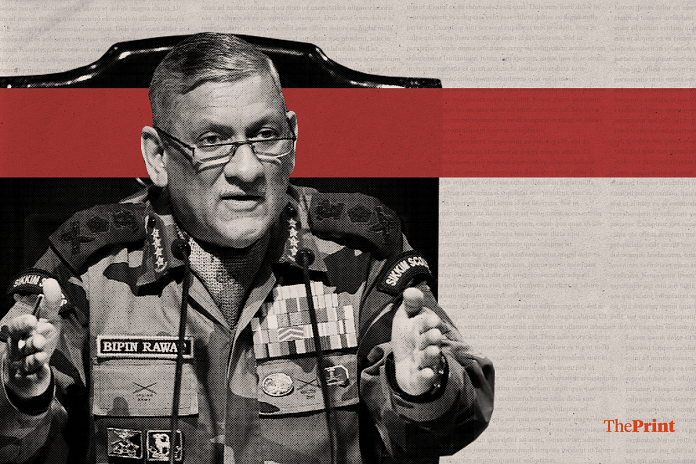A set of 23 directives by Army chief Bipin Rawat addressed issues like social behaviour, promotions, corruption, use of social media, and budgetary constraints. The move which includes provisions like not serving pakodas has drawn flak from veterans who say the Army isn’t addressing real issues.
ThePrint asks: Army chief’s proposal an attempt to cut expenses or diversion from real issues?
Army chief cannot always be talking about what is happening in Kashmir
 Amit Cowshish
Amit Cowshish
Former Financial Advisor, Ministry of Defence
To say that unhealthy food should be replaced with healthy food is not really wrong. In principle, all that the army chief has said makes sense. There is nothing wrong with the chief asking for the controlled use of social media. At the same time, it is no secret that the rations available in the canteens do get sold in the markets. If he says that these will be controlled and people will be promoted in spite of not attending the National Defence College, there is hardly anything objectionable in it.
Little is known about the “real issues” that the question seems to mention. If one is referring to the problems in Kashmir, I don’t see any correlation between the two. These are, in fact, mutually exclusive.
The army chief cannot always be talking about what is happening in Kashmir. Yes, he should be concerned about it, but does not mean that he should not be concerned about anything else?
Nobody really knows the details of the order. There is a distinct possibility that some of the directives may help reduce expenditure.
However, to say that you are going to bridge a huge gap of monetary deficit by taking these small measures is unrealistic. It might help, but I am not sure what impact it will have in a larger context.
If one evaluates these things on a standalone basis, they are, indeed, good measures. However, they may or may not result in savings.
Directives based on cases which are aberrations only create a negative outlook
 Major Priyadarshi Chowdhary
Major Priyadarshi Chowdhary
Former Indian army officer
There are several real issues facing the army at present. The issue of degradation and equivalence of ranks is one of them. There is a huge loss of morale because of this. The cantonment gate orders have rattled families.
The 23 directives issued by Army Chief Bipin Rawat are just a diversion. Most of these issues shouldn’t be public at all. These are internal matters of the Army. Soldiers have authorised rations. If you want to change what they eat, alter the ration scales to add healthier alternatives. Why issue a directive like this stating whether or not pakodas should be served? It seems silly.
The same applies to unit canteens. There is a well laid-out procedure in the defence services regulations. If there are problems, the chief can consider altering that. Even when it comes to discipline for that matter, if officers are misusing their position, punish them. You cannot quote aberrations and use them as an excuse to change established procedures and systems.
A negative outlook is created when a directive is issued based on cases which are aberrations. They make it seem like they are a routine practice. Someone who doesn’t understand the military ethos will perceive them in a bad light.
If changes are to be incorporated, they must be done internally. In the meantime, issues of real importance can be addressed. These include disability pensions and pensions for war widows.
The way we veterans see it, these are diversionary tactics.
These are internal guidelines, their intention is not mala fide
 Major Akhill Pratap
Major Akhill Pratap
Former Indian army officer, and author
First, these aren’t directives, but guidelines. And, these are issued periodically. They may be interpreted as directives because when the chief speaks you ought to listen.
These are sort of austerity measures to prevent I’m-all-right-Jack syndrome and check complacency in soldiers. There is nothing new about it.
To answer why these directives now – it is primarily meant to address uneasiness in the ranks. Issues regarding the OROP, the Seventh Pay Commission, and the non-functional upgrade (NFU) are yet to be fully resolved.
People can lose hope. Considering the job that the army does, we need to be careful that discontent shouldn’t turn into resentment.
The directives will help address problems better considering social media is very active now. The rules remain the same, but earlier the dissenting voices weren’t heard as easily.
The chief has done what he got to do. For example, when he says refrain from puris or pakodas, the operative words are ‘deep fried’, not puris or pakodas. It is a positive guideline for soldiers to help them stay fit.
However, there are a few points where we may differ. At a time when we are struggling with the defence budget and basic requirements for soldiers, some of these points may come across as bothersome. However, compatriots shouldn’t be sceptical of the army at all times because that will only have a negative impact on the force’s morale.
These are internal guidelines. The fact that they have been reported in the media shows that the intentions are not mala fide. For instance, the chief has said that army personnel shouldn’t do menial jobs. Army works on a system of buddy-pairs, and orderlies aren’t meant to walk the dog or wash clothes, but then you ought to lead by example, whosoever it may be. You can’t play golf, when soldiers are in the line of fire.
If there are matters bothering officers and personnel across the spectrum, for long, they have to be addressed before the concerns become issues.
Army chief Bipin Rawat’s set of 23 directives signals a possible reset in policies
 Sujan Dutta
Sujan Dutta
Defence Editor, ThePrint
Most journalists covering defence in India would give an arm to write the kind of introduction that Time magazine had for a story last month: “The Indian Army needs almost everything except courage”.
Army chief Bipin Rawat’s set of 23 directives signals a possible re-set in policies that could lead to a restructuring of the military and a shift in the culture to make military lifestyles, already shaped by deployment to hard field areas, more spartan.
But the Army – indeed all the armed forces – have to take a harder look within their own institutions, like the canteen stores department. General Rawat’s attention to detail in his directives — from suggesting a healthier diet for the serving as well as for the veterans, to checking pilferage and clamping down on corruption — needs to be matched by measures to ensure efficiency. For example, the complaints that essential provisions of good quality in adequate quantity were not available in the canteens need to be addressed urgently.
Equally important is the attention to soldiers who get superseded and have to retire from service at a relatively young age. In the months ahead, the army would be seeking to cut down its size or ‘shed flab’ so that there is more money available to buy equipment.
The army has identified the acquisition of ISR (Intelligence, Surveillance and Reconnaissance) capabilities and heavy artillery as “operationally critical” requirements. Such equipment does not come cheap anywhere.
With the implementation (of sorts) of the ‘One Rank One Pension’ (OROP) scheme, the drain on defence allocations has become severe. It may be argued that the funds crunch should have been foreseen.
It may also be asked if the office of the chief of army staff should concern itself with the nutritious value of fried food (pakodas) instead of spending time more judiciously on policy and operational matters. The opposite of this argument is that the chief has shown an eye for detail.
The disgruntlement among some in the serving and veteran community is partly informed by the perception of the chief being a political appointee because the government did not go by the principle of seniority alone in choosing General Rawat. Another factor informing the debate is the opening of cantonment roads that is interpreted as a risk factor for military families at a time when terrorists can attack military stations such as Pathankot.
Compiled by Deeksha Bhardwaj and Prerna Chatterjee, journalists at ThePrint.




Senior officers who are promoted or appointed as alms granted by political bosses are liable to be their stooges and present one is no exception.Rather than addressing the REAL issues plaguing Army like NFU ,Loss of parity to civil counterparts,Shortage of infrastructure and equipment,Seething resentment amongst services for being shortchanged and all senior rank vacancies being hogged in name of combat arms and morale of the Army in general being ALL time low, he is making these lofty public statements.The aim is TWO fold, to divert the attention from the above mentioned GRAVE issues and project his own image as some reformist figure taking on the archaic organisation so as to prepare ground for POLITICAL Career post retirement. God save the Defence forces from the self serving senior officers who have led to dismal state this great Army is in.
Jai Hind
Chiefs directives are right and need to be communicated to appropriate levels of command for 100% effective implementation “internally”.
We do understand and appreciate such directives are generated and implemented by equivalent services (IAS, IPS, IFS, etc) from time to time but done in a very subtle manner with utmost attention of keeping morale and integrity of the system of administration.
Hope the chief takes cue from them.
Modi ji says sell pakodas, Army Chief says don’t eat them – this COAS has always been verbose when silent working is the order of the day.
Cost cutting to an extent is OK to be a concern for the Forces. But this cost cutting ‘paranoia’ tends to impact on issues like cantonments, essential equipment etc. Let the elected leaders and the babus find the money. The horde of subsidies that is disproportionate to the problem solving skills and ability of the civil and political administration is the place to look for cost cutting. And Army should not rush to build ‘FOB’ etc to cover for the inefficiency of the govet departments like Railways. Maybe they could cost it at the going market rate if saving money or making money is to be army’s concern. One solid challenge by any of our ‘friendly neighbors’ will quickly expose our vulnerability even after 7 decades of ‘developing’. Let us not fool ourselves that ‘we will be able to take on a multi prong threat and win it. Ask the real soldiers. Without disrespect to our chief, I strongly feel he is toeing a line that cannot augur well for the country. His sight is now seems set on a political role.
It appears that the chief and senior officers nurture political ambitions
COAS orders only for orders not for implementation. Implementation in army is a life long process. COAS is showing his view in this massages. On ground truth in army is totally different mainly officers & men relationship. COAS passed the massage to the officer to improve the relationship with jawans and try to understand their views.
The perception of the Chief is good , however, it is so fantastic to be seen that even a single word, related to the disparities of the 7th CPC including the OROP , has not come out or uttered since promises and consolations are being given to the PBOR {‘on free of cost’) until the next pay commission occurs as well…!!
Army Chief should have concentrated on achieving some positive results in the matter of pending issues like anomolies of 6th and 7th pay commissions, OROP, NFU, problems of reservist and widows. Then his advisories would have been seen by the soldiers and veterans in a positive light. Using his powers only to water down everything without adding any welfare measure has only lowered the morale of all affected personnel. He doesn’t have anything to show that he has welfare of soldiers at heart, but only his power to cut down on all previleges.